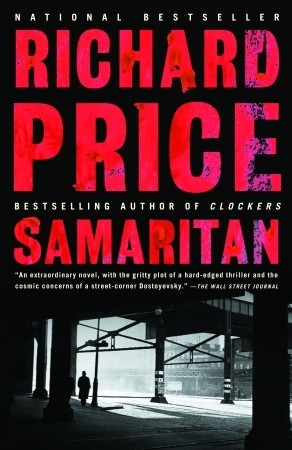Read the first few pages of Samaritan, Richard Price’s latest epistle from the ghetto, and it’s clear Price wants this book to be a serious thriller. It begins with a passage from the King James Bible and a prologue that’s red-faced with effort:
The sky, in Price’s New Jersey, is “tinged with electric blue.” Trees dangle with “sneaker-fruit.” The windows of project houses look like “hundreds of aluminum-framed eyes twitching TV-light silver.” And “above it all, [are] the stars, faintly panting, like dogs at rest.”
Most of this is packed into one long rug burn of a sentence.
Price tries to be hard-boiled, lyrical, and thoughtful. Yet one immediately senses that he writes like this out of vanity, because he wants somebody to use those kinds of adjectives in a review. The images come off not as cause for reflection, but as evidence of authorly browbeating.
After this unforgivable beginning, Samaritan cools down. Rather quickly it becomes a humble genre piece: a simply-told if lethargic whodunit, the story of a man trying to buy his way out of his past.
It begins with the assault of a volunteer school teacher named Ray Mitchell. Left in the hospital with life-threatening head injuries, he refuses to tell the police who assaulted him.
Ray is a successful screenwriter who, for mysterious reasons, quit his high-paying job on a top TV series to return to the ghetto town he grew up in — there are hints, we learn early on, that Ray was forced out because of a racial “incident.” Like Richard Price, Ray Mitchell is white.
His assault is being investigated by (and the other half of the book is narrated from the perspective of) an African-American childhood friend, Nerese Ammons. Nerese is a police officer on the verge of retirement whose career has suffered under the twin screws of being female and being black.
But Samaritan is only peripherally about race. Ray’s biggest sin is that he tries to make up for past mistakes by being overly kind to the down-and-out: usually by giving them money. But his generosity, and this is the joke of the title, is mostly narcissistic.
Nerese, herself a compulsive philanthropist, realizes that Ray’s charity “wasn’t really about race… The element of race, the chronic hard times and neediness of poor blacks and Latinos was primarily a convenience, the schools and housing projects like a stocked pond in which he could act out his selfish selflessness over and over.”
In its best moments, Samaritan is a meditation on how the most altruistic people (social workers, police officers, philanthropists) can be motivated by fanatical self-absorption. As college alumni associations are well aware, philanthropy can merely be a desire to inflict one’s own life narrative on someone else.
Thoreau said about philanthropy (a “greatly overrated” virtue) that “there is no odor so bad as that which arises from goodness tainted… It is human, it is divine, carrion.” This putrid combination of the venal and the angelic is what seems to define Ray, who is too stoned to stick around for his child’s birth, but who spends the rest of his life trying awfully hard to make up for it.
Ray tries to ingratiate himself to everyone, especially his awkward foal of a daughter, Ruby. As a result, he tends to “blow everything up past the moment,” and he speaks with the relentless urgency of a lifelong cokehead.
A representative sentence: “And, my grandmother, Jackie’s mother’s sister, her name was Cecil, she told me that when Jackie was little she’d hear him down in the street calling up, `Aunt Cecil, Aunt Cecil,’ you know, down there by himself, this was on Tonawanda Avenue back in the early fifties, my whole family, aunts, uncles, grandparents, they all lived in three, four different walk-ups on Tonawanda…”
Price, it ought to be said, has a keen ear for dialog; more than that, he is a savant who has the exceptional gift of merely seeming to transcribe, never manufacture.
Yet, like Ray, Samaritan tries too doggedly to please in some sections, and in others simply ends up long-winded and undisciplined. And as a piece of inner-city atmospherics, it falls far short of good journalism — like William Finnegan’s blemished, brilliant portrait of New Haven in Cold New World.
This is, in short, bloodless work. Price is an extraordinary novelist, as he proved with his most popular novels, Clockers and Freedomland. This time around he is deflated and joyless, a talented professional who seems uninspired by what he is doing.

